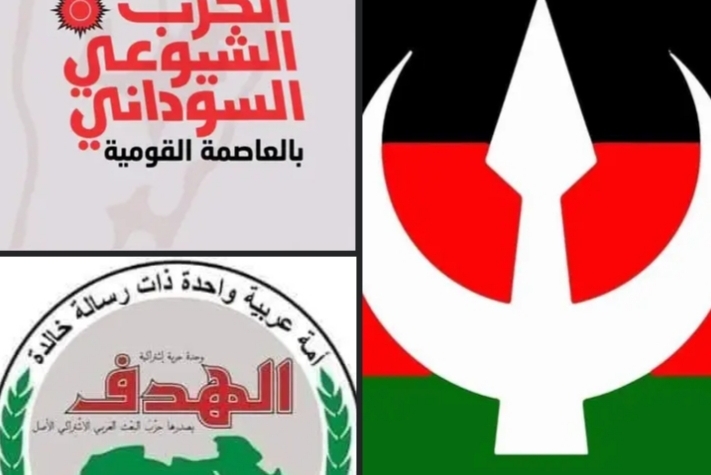Sudan war: three political parties reject ‘political settlement proposal’

Logos of the National Umma Party, the mainstream Arab Socialist Ba’ath Party, and the Communist Party of Sudan
The National Umma Party, the Arab Socialist Ba’ath Party, and the Communist Party of Sudan yesterday announced their rejection of “a political settlement project being discussed in secret”. The settlement would end the more than 11-month-long armed conflict between the Sudanese Armed Forces (SAF) and the Rapid Support Forces (RSF) by giving both sides a share in the government to be formed after the war.
Following a meeting in Cairo on Thursday, the three parties yesterday said in a joint statement seen by Radio Dabanga that they are working together “to present a political vision to build the largest mass civil front to stop the war.
“The priority now is to alleviate the human suffering resulting from the war,” they stated.
The political parties place responsibility for the war that broke out on April 15 last year on both parties to the conflict “who do not give the slightest consideration to the consequences of this disastrous chaos for our country and its future.
“The violence by both sides against defenceless civilians makes them partners in war crime, which will not be dropped by such a political settlement. Experience on the ground proves that they are morally and legally unqualified to be part of any political project,” the joint statement reads. “Their war crimes, crimes against humanity, and genocide, should not be allowed to go unpunished.
‘Totalitarian’
Following a meeting in Cairo on Thursday, the three parties the next day reported “leaks and (unpublished) information regarding the preparation of a settlement in the past few days”.
The proposal concerns a “totalitarian regime” in which power will be shared for a period of ten years between the two warring parties, a number of rebel movements and certain civil society organisations.
The three political parties stated that they reject the proposal “in form and content” and underscored “the danger of identifying with it or remaining silent about it”.
They referred to “external interventions working to impose a partnership of political groups with the military, repeating the experience of the previous partnership.”
The meeting further emphasised the importance of good governance. “Political parties are the basis of a government, and civil society organisations and trade unions play a complementary role to achieve good governance. Replacing them by other actors will have dire effects and distort democracy.”
So far, no intermediary has succeeded to bring the commanders of the warring parties to the negotiation table. The SAF and RSF sent delegations to the Jeddah negotiations held under auspices of the USA and Saudi Arabia, and the short-term truces they agreed on were all violated on the first day.
The Horn of Africa Intergovernmental Authority on Development (IGAD), backed by the African Union, took the lead for talks in December last year. RSF Commander Mohamed ‘Hemedti’ Dagalo agreed to sit with SAF Commander Abdelfattah El Burhan, to be organised by the and. El Burhan initially agreed to come but he was rapidly overruled by the Sudanese FA Ministry.
Talks held in Manama, Bahrain, in January led to an initial agreement but collapsed later, because the SAF delegates did not seem committed anymore to continue with the meetings.
Abdalla Hamdok, former PM and chair of the Civil Democratic Forces alliance (Tagaddum), formed in October last year with the aim to end the war and guarantee a new civilian government, travelled to Cairo last weekend, on an official invitation of the Egyptian authorities. He told El Sudani newspaper on Tuesday that Egypt may host a meeting between El Burhan and Hemedti.
Hemedti already agreed to meet in Cairo “in order to stop the war”. With regard to El Burhan’s categorical refusal to meet face-to-face with the RSF leader, With regard to El Burhan’s categorical refusal to meet with Hemedti, Hamdok has discussed this problem with the Egyptian leadership.
While Tagaddum remains neutral, the recently formed Sudanese National Forces Coordination (NFC) headed by Malik Agar, vice president of the Sovereignty Council, supports the SAF. The new coalition on Wednesday announced its intention to sign a political accord with the army.











 and then
and then